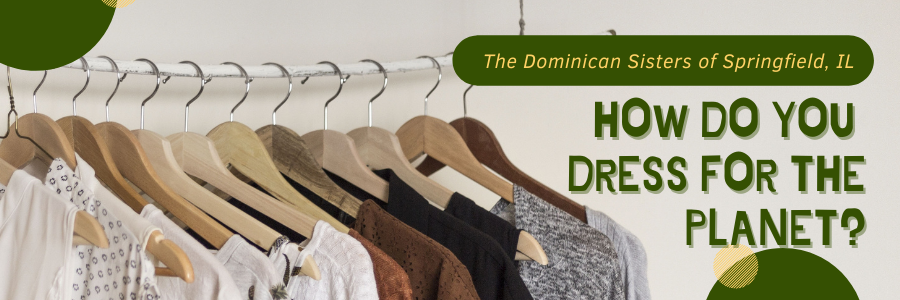
This blog post from Grist, a climate justice news website, prompted reflection on how Springfield Dominican sisters and associates live their own commitments to simplicity and care for creation through the way they consume clothing.
Convent “Swap Shops”
For years now, it’s been the practice to have a “swap shop” at Sacred Heart Convent. This small closet in the laundry has served the community well. Sisters contribute clothing they no longer need; other sisters make it their first stop when shopping for a new item. Someone is responsible for periodically removing items that don’t “sell” and donating them to the St. Martin DePorres Center for redistribution.
Click HERE to learn how to organize your own swap shop event.
This year, the sisters introduced a variation on the theme by expanding the swap shop to include the approximately 80 coworkers who work alongside them at the motherhouse. A couple of times during the year, on the appointed day, everyone is invited to bring gently used clothing items to tables in Aquinas Center, and everyone is invited to browse for what they might need. This is an eminently practical approach to reducing garment waste.
Caring for clothing
Sister Marcelline Koch, who heads the sisters’ justice office, has relied for years on clothing bequeathed to her by her own sisters and friends. “If I do purchase clothing, it’s almost always at a sale price, thoughtfully done because I know I’ll wear it for a long time,” she says. “I want it to be something I like and find serviceable. I limit the colors I have so that I can mix and match with fewer outfits.” Another part of Sister Marcelline’s clothing consciousness is her decision to air dry them after a quick fluff-up in the drier. This is good all around. It saves energy and reduces the wear that occurs from tumbling.
Needing less
Used clothing stores are also wonderful places to look for clothing, if you are the patient type who doesn’t mind the time it takes to browse. That is the case for Sister Lori Kirchman, the liturgist at Holy Family Parish, Lincoln, Ill. Her first choice is to shop at Good Will or Salvation Army “Because not taking more than I need is important to me,” she says. “Before I buy a piece of clothing, I ask myself, ‘Do I need this? Will it go with other things that I already own?’”
Click HERE to find second-hand stores in your area.
Wear it out, use it up
Cynthia Gallo Callan, a Dominican associate since 2005 and self-proclaimed lover of clothes, says that she buys nearly nothing new other than shoes and underwear. She likes to shop the upscale used clothing stores. “If I do buy new it is for a very special occasion (far and few between),” Cyndi says. In that case she shops at a local fair-trade store, where she knows the makers of her new fancy duds were treated justly and received fair compensation for their labor, she says.
Her clothing purchases are clearly something Cyndi has thought about carefully. Why? “First, I think a person needs to pick and choose how they spend their monies,” she says. Her second reason? “To help our environment we need to repurpose,” she reasons.
“I try to find gently used clothing that fits my style (don't wish to be frumpy) and try to stay away from clothes made in China,” she says. When she is done with her clothes she donates them to one of the local second-hand shops.
Thinking about shoes and issues of sustainability gives Cyndi angst. “It kills me when I have to get new shoes,” she says. “I wear through soles quickly since I walk so much.” She says a pair of walking shoes she bought last August had over 600 miles on them. Because most shoes today cannot be re-soled, that means they end up in landfills. Not to mention that shoes are expensive too, she opines. “I just bought two pairs for summer. $300!!!!! Disgraceful.”
Cyndi’s philosophy is also Sister Sharon Zayac’s. Sister Sharon, the founder of Jubilee Farm and a sought-after speaker on topics of ecospirituality and Earth justice, says she limits the size of her wardrobe and very rarely purchases new. She keeps a few appropriate outfits she wears for lectures and presentations, which she washes in sustainable soaps and hangs to dry. Most often, she says, “I purchase second hand, swap with others, look for non-synthetic materials, and am careful about choosing items that have particularly toxic dyes. My clothes last a long time!” When they are used up, she says, “they become rags or art projects.”
The geopolitics of clothes
Carrie Becker became a Dominican associate in 2018. She likes to buy well-made clothes that will last. “I wore a dress last week that I like a lot and have had since 1991!” she shares. “My only pair of dress heels is over 10 years old and have gotten new heel caps on them several times.” Like Cyndi, it’s clear that purchasing clothing is something Carrie puts some thought into.
“I don’t buy a lot of second hand because I can’t often find my size,” she says. Carrie, who has three granddaughters, says she understands why parents buy inexpensive (and sometimes poorly made) children's clothing because they either outgrow it or wear it out quickly, but she is also sensitive to the geopolitical realities of clothing. “So much is made by underpaid and overworked people in China or Asia somewhere,” she says.
Check out this list of U.S. companies using unfair labor practices to make your clothes and shoes.
What about you?
Please share your tips for dressing sustainably in the comments below.

